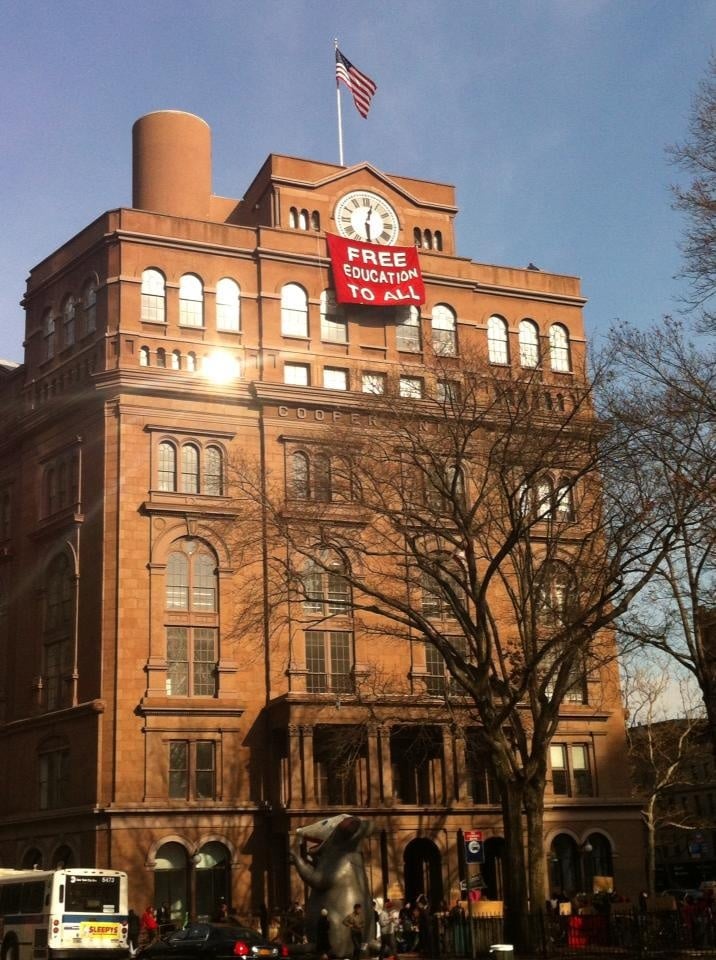
Cooper Union, the embattled New York college, has apparently found a way to begin charging its students tuition, according to an email yesterday from Cooper Union’s dean of engineering Teresa Dahlberg.
Dahlberg writes:
The Board of Trustees approved new tuition rates at their meeting on March 11.… It includes an overload charge for credits taken above 19.5 per semester. It also includes tuition for summer courses. These rates apply to all Cooper Union students, not just engineering. The rates were proposed by VP of Finance and Administration Bill Mea and vetted by the Board’s Finance Committee prior to the Board meeting. They were then proposed, discussed, and approved by the full board on March 11.
“Many students do overload each semester,” engineering senior Harrison Cullen told artnet News via email. “I would estimate anywhere between 15% and 20% of all students exceed 21 credits.” Cullen was first to learn about the new initiative, in a meeting with Dahlberg and then in the email. No information has been released about what the new charges might be.
“The old ‘threshold’ for overloading was 21 credits,” he added, “but it had only required advisor approval to go beyond that limit in the past (no extra payment).”
Art school alum Victoria Sobel agreed that the move would effectively institute tuition for most if not all students since they have typically averaged at least 21 credits per semester.
“But historically, Cooper students have far surpassed that,” Sobel told artnet News, “especially engineering students who are trying to earn a master’s degree in four years.”
Sobel had a star turn in the 2014 documentary Ivory Tower, directed by Andrew Rossi, which looks at the rising costs of higher education in the U.S. and spends considerable time on the case of the Cooper Union. “There’s all sorts of things that got us into this mess,” she says in the film, “and it wasn’t the cost of educating the students.”
The school’s decision to institute tuition has led to an investigation by New York Attorney General Eric Schneiderman (see Scandal Erupts as New York Attorney General Investigates Cooper Union for Shady Financial Dealings and Cooper Union Alumni and Students Strike Back at President’s “State of Cooper Union” Report).
There’s also a lawsuit pending to stop the school from charging entering students after being tuition-free since its founding in 1859 (see Cooper Union Alumni Sue School Over Tuition Scheme). The college, with schools of art, engineering, and architecture, was founded by industrialist Peter Cooper on the philosophy that education should be “as free as air and water.”
The school’s press office has not replied to a request for comment except to say that “the facts in the email are incomplete and out of context.”
Alumni and students, on the other hand, have been quick to react.
Art school alumnus Joe Riley wrote on Save Cooper Union’s Facebook page asking why “community thoughts/opinions” weren’t “sought out in specific regard to this decision.” He added, “Why are we only hearing about this now? Surely no one on the board thought that alumni and students would quietly accept this.”
UPDATE: A representative of the college tells artnet News via email that the school “will hold back on the charges pending further community discussion.”
Vice president Bill Mea has followed up with a letter that is now being sent to the Cooper community. In it, he says: “This charge would have applied to the current freshmen class and future classes. … Having seen yesterday’s reaction to the overload charge, I can say that I am still learning about the culture of Cooper Union. I value our unique character and I wish to honor it. … This is certainly not the time to implement such a policy, and it may never be the right time to do so. I thank you for your patience in my education in The Cooper Union way.”
Read the full letter here.